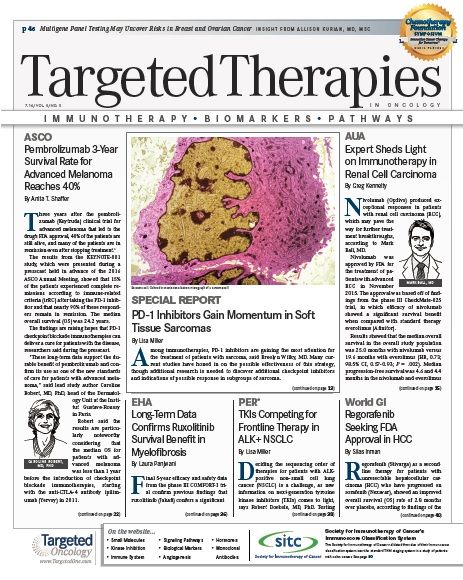From the Editor: Targeted Therapy and Immunotherapy Expanding into More Cancer Types
Howard L. Kaufman, MD, FACS
An underlying theme of several recent oncology meetings was the slow but steady expansion of targeted therapy and immunotherapy into new types of cancer. While the results are encouraging, there are clearly remaining challenges for the field.
An important example may be the data from various soft tissue sarcoma clinical trials, which are showing, at best, modest responses to PD-1 blockade and tyrosine kinase inhibition. Nonetheless, further study is likely warranted as understanding the mechanisms of resistance may provide new insight into drug resistance and identify new pathways for future drug development.
A more encouraging report was 3-year survival data for patients with melanoma treated with pembrolizumab, an antiPD-1 monoclonal antibody. Similar to long-term follow-up data with ipilimumab suggesting an inflection point at 3 years, pembrolizumab also appears to be associated with durable responses and a flattening of the survival curve at 3 years. Although further follow-up at 5 years is needed, the emerging data suggest that pembrolizumab may be associated with long-term survival benefit in melanoma.
Other intriguing data in melanoma relate to the association between obesity and clinical outcomes highlighting the potential role of metabolism and obesity in this disease. Further immunotherapy data in other cancers, including new survival data for nivolumab, another PD-1 inhibiting monoclonal antibody, in patients with nonsmall cell lung cancer, and exciting results with chimeric antigen receptor T cell therapy targeting CD19 in patients with B cell acute lymphoblastic leukemia are profiled in this issue.
In addition to immunotherapy, clinical results of studies with targeted therapy will also be highlighted this month. Experts in the field will discuss the issues surrounding the role of EGFR inhibitors in the treatment of non-small cell lung cancer in the current therapeutic landscape, results from a combination clinical trial of cobimetinib (a MEK inhibitor) and atezolizumab (an anti-PDL1 monoclonal antibody) in patients with colorectal cancer and intriguing results of an olaparib (a PARP inhibitor) clinical trial in women with ovarian cancer suggesting an overall survival benefit. Other interesting developments come from clinical studies of the cyclindependent kinase (CDK) 4/6 inhibitor, abemaciclib, in patients with hormone-positive but HER2-negative breast cancer and a clinical study of a trastuzumab biosimilar in HER2+ breast cancer.
Finally, this issue will contain several articles on new data related to advanced GI cancers, which have remained relatively resistant to both targeted therapy and immunotherapy. First, a discussion on the role of fibroblast growth factor receptor (FGFR) mutations in cholangiocarcinoma identified a novel therapeutic target for clinical development. Secondly, the management of colorectal cancer metastases to the liver will be reconsidered in the modern era with attention to the role of delayed surgical resection following systemic therapy with newer agents.
These and other reports highlight the incremental progress being made in various cancers using targeted therapy and immunotherapy. While promising in so many respects, further research is needed to better understand mechanisms of drug resistance, to identify and validate universal predictive biomarkers, and continue the investigation of combination therapeutics, sequential treatment regimens, and long-term follow-up of patients on contemporary systemic therapy clinical trials.

Survivorship Care Promotes Evidence-Based Approaches for Quality of Life and Beyond
March 21st 2025Frank J. Penedo, PhD, explains the challenges of survivorship care for patients with cancer and how he implements programs to support patients’ emotional, physical, and practical needs.
Read More